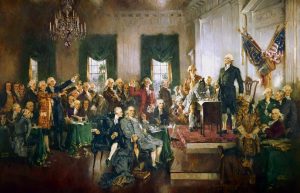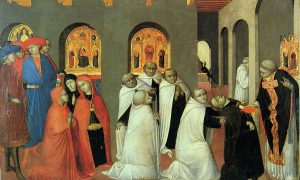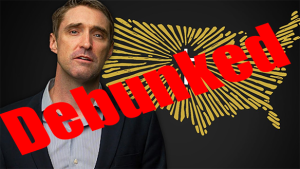“Very truly I tell you,” Jesus answered, “before Abraham was born, I am!” – John 8:58
Cultural Christianity is the idea that we can support Christian beliefs and culture while not believing Christ is divine. The belief serves as an archetype of the ideal human being, and we should follow his example, whether or not we believe he is truly the son of God.
“Christ’s archetypal death exists as an example of how to accept finitude, betrayal and tyranny heroically-how to walk with God despite the tragedy of self-conscious knowledge-and not as a directive to victimize ourselves in the service of others. To sacrifice ourselves to God (to the highest good, if you like) does not mean to suffer silently and willingly when some person or organization demands more from us, consistently, than is offered in return. That means we are supporting tyranny, and allowing ourselves to be treated like slaves. It is not virtuous to be victimized by a bully, even if that bully is oneself.” ― Jordan B. Peterson, 12 Rules for Life: An Antidote to Chaos
“I believe in the Christian principles, you know, “Love thy neighbor.” I believe in “Turning the other cheek,” which is very important to have forgiveness.”
Many within the church treat this cultural Christianity as “diet Christianity”. They view individuals like Elon Musk and Jordan Peterson as Christians who “are almost there, they just haven’t figured it out yet”. Let’s be clear: Cultural Christianity is a false teaching and perversion of the gospel. It is as far from true Christianity as Islam, Mormonism, Buddhism, and any other false religion.
What Christ Taught
What we need to understand first is that Christ taught his divinity more than he taught anything else (John 8:58, John 10:30, John 14:9, Matthew 1:23, Matthew 11:27, John 14: 1- 7, John 5:18, John 1:1, Luke 22:70, Luke 9:35, Luke 5:20, Luke 6:5, Mark 14:62, Mark 1:1, Mark 12:35-36, Mark 2:1-11). Looking at the examples Elon Musk gave in his quote, it becomes clear that we can not separate Christ’s Divinity from the other things that Christ taught.
Turn the other cheek
“You have heard that it was said, ‘Eye for eye, and tooth for tooth.’ But I tell you, do not resist an evil person. If anyone slaps you on the right cheek, turn to them the other cheek also.” (Matthew 5:38 – 39)
Turn the other Cheek is one of many teachings Christ made in the passage of scripture we refer to as the Sermon on the Mount. The passage that ends with this verse.
“When Jesus had finished saying these things, the crowds were amazed at his teaching, because he taught as one who had authority, and not as their teachers of the law.” (Matthew 7:28 – 29)
This “authority” refers to Christ’s divine authority as God. Throughout the Sermon on the Mount, we see Christ comment on Heaven, Hell, and the Kingdom of God. Things he could not possibly teach on unless he had divine authority. Things not even the prophets of God commented on.
Love thy Neighbor
“One of the teachers of the law came and heard them debating. Noticing that Jesus had given them a good answer, he asked him, “Of all the commandments, which is the most important?”
“The most important one,” answered Jesus, “is this: ‘Hear, O Israel: The Lord our God, the Lord is one. Love the Lord your God with all your heart and with all your soul and with all your mind and with all your strength.’ The second is this: ‘Love your neighbor as yourself.’ There is no commandment greater than these.”
“Well said, teacher,” the man replied. “You are right in saying that God is one and there is no other but him. To love him with all your heart, with all your understanding and with all your strength, and to love your neighbor as yourself is more important than all burnt offerings and sacrifices.”
When Jesus saw that he had answered wisely, he said to him, “You are not far from the kingdom of God.” And from then on no one dared ask him any more questions.” (Mark 12:28 – 34)
This passage begins with a teacher of the law asking Jesus which of God’s commandments was the greatest. Jesus responds, telling him “Love thy Neighbor” to be the second most important, with “Love the Lord your God with all your heart and with all your soul and with all your mind and with all your strength” being the first. Showing that Christ taught a Love and Fear of the Lord. More significantly, at the end of this passage, we see him speaking with the same authority he spoke with in the sermon on the mount, “You are not far from the kingdom of God.” He speaks with an authority that the virtuous do not speak with. The crowd goes silent, asking him no more questions because of this.
We should also look at the two passages surrounding this one. In the previous passage Jesus speaks on the resurrection of the dead. Once again speaking with authority about the Kingdom of God, something he could only do if he were more than a man.
“Now about the dead rising—have you not read in the Book of Moses, in the account of the burning bush, how God said to him, ‘I am the God of Abraham, the God of Isaac, and the God of Jacob’?” (Mark 12:18 – 27)
The passage following Christ’s teachings on the greatest of the commandments is Christ teaches that he is God:
“While Jesus was teaching in the temple courts, he asked, “Why do the teachers of the law say that the Messiah is the son of David? David himself, speaking by the Holy Spirit, declared:
“‘The Lord said to my Lord:
“Sit at my right hand
until I put your enemies
under your feet.”’David himself calls him ‘Lord.’ How then can he be his son?”
The large crowd listened to him with delight.” (Mark 12:35 – 37)
This passage is Christ pointing to scripture and saying, “You see David called the messiah Lord, the same title he used when referring to The Lord God Maker of heaven and earth.” You cannot have Christ teaching us to “Love thy neighbor” without him twice speaking with divine authority and then proclaiming that he himself is God.
Foundational and Inseparable
It is not just that Christ taught he was God alongside his other teachings. It is that everything Christ taught is informed and fueled by his being God. Saying you believe in Christ’s teachings but not his divinity is buying a car without an engine. His teachings have no value or place if he is not the Son of God.
For example, Christ teaches us to forgive evil doers because he forgave us our trespasses and wiped our slate clean. We are also told to forgive evil and injustice, knowing that we have a Heavenly advocate and all things will be set right in the new creation. If we remove these things, if we say Christ did not forgive us and that there is no Justice in a new creation, then it would not be in our best interest for the greater good to forgive those who do evil. If God is merely a metaphor for the “greater good” as Peterson suggests, then forgiving evil only serves to harm the greater good. We forgive evil because our evil was forgiven, we turn the other cheek because we know one day all things will be made just. Without this, the only justice we have is the justice we ourselves create.
Christs Character
Even just looking at the virtues we associate with Christ, it becomes clear we cannot separate the things we like about Jesus from his Divinity. If we try to remove it, making him just an “archetype” for ideal humanity, we remove those good, wonderful things of Christ that we try our best to emulate
- Honesty: If he were not the Son of God, he would be a liar who should not be trusted. Praise be, this is not the case, for if Christ did not speak the truth, there would be no joy nor hope for humanity.
- Christ’s humility is found in his incarnation: We associate Christ with humility because the Son of God was manifest in the flesh and born of a sinner’s womb. If Christ were just a man, he’d be a delusional narcissist. The crazed son of a carpenter who ran around claiming to be the son of God.
- Christ’s Forgiveness and Grace are founded in his Godhood: For if Christ were not God, he would have nothing to forgive us for. If he were not God, he would not be in a position to forgive us for our sins. His beautiful sacrifice, which all of scripture points to, has no meaning. For he died so we may be forgiven for our trespasses against God.
The Point
Christian, beloved Christian, do not associate with these people. Anyone who claims to be a cultural christian is a fool or a liar and almost certainly has never actually read scripture. To deny Christ’s Divinity is to deny his Decency and goodness. This is why Cultural Christianity is so dangerous; once you deny Christ’s Divinity, his teachings can no longer be objectively defined. Once you say Christ isn’t the Son of God. His teachings can be whatever you want them to be.
Sources:
Peterson, Jordan B. 12 Rules for Life: An Antidote to Chaos. CELA, 2021.
Elon Musks Walk with Jesus – Beliefnet, www.beliefnet.com/entertainment/celebrities/elon-musks-walk-with-jesus.aspx. Accessed 27 Sept. 2025.



